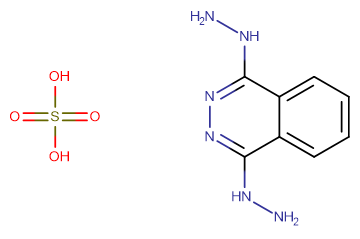
Dihydralazine sulphate
CAS No. 7327-87-9
Dihydralazine sulphate( —— )
Catalog No. M15803 CAS No. 7327-87-9
Dihydralazine is a drug with antihypertensiveproperties.It belongs to thehydrazinophthalazine chemical class.It has very similar effects to hydralazine.
Purity : >98% (HPLC)
 COA
COA
 Datasheet
Datasheet
 HNMR
HNMR
 HPLC
HPLC
 MSDS
MSDS
 Handing Instructions
Handing Instructions
| Size | Price / USD | Stock | Quantity |
| 10MG | 45 | In Stock |


|
| 25MG | 63 | In Stock |


|
| 50MG | 90 | In Stock |


|
| 100MG | 120 | In Stock |


|
| 200MG | 168 | In Stock |


|
| 500MG | Get Quote | In Stock |


|
| 1G | Get Quote | In Stock |


|
Biological Information
-
Product NameDihydralazine sulphate
-
NoteResearch use only, not for human use.
-
Brief DescriptionDihydralazine is a drug with antihypertensiveproperties.It belongs to thehydrazinophthalazine chemical class.It has very similar effects to hydralazine.
-
DescriptionDihydralazine is a drug with antihypertensiveproperties. It belongs to thehydrazinophthalazine chemical class.It has very similar effects to hydralazine.
-
In Vitro——
-
In Vivo——
-
Synonyms——
-
PathwayOthers
-
TargetOther Targets
-
RecptorOthers
-
Research Area——
-
Indication——
Chemical Information
-
CAS Number7327-87-9
-
Formula Weight288.28
-
Molecular FormulaC8H12N6O4S
-
Purity>98% (HPLC)
-
SolubilitySoluble in DMSO
-
SMILESOS(O)(=O)=O.NNC1=NN=C(NN)C2=CC=CC=C12
-
Chemical Name——
Shipping & Storage Information
-
Storage(-20℃)
-
ShippingWith Ice Pack
-
Stability≥ 2 years
Reference
1.Stern, H. C.British heart journal. 52 (4): 435–439.
molnova catalog



related products
-
Luteollin 5-glucosid...
Luteolin 5-O-α2-glucopyranoside has antioxidant activity, it can inhibit lipid peroxidation, and has DPPH radical-scavenging activity.
-
Thioctic acid
THIOOCTIC ACID, a natural product, is reported to have antioxidative property.
-
Cefpodoxime (free ac...
Cefpodoxime (free acid) is an oral, third-generation cephalosporin antibiotic. It is active against most Gram-positive and Gram-negative organisms, except Pseudomonas aeruginosa, Enterococcus, and Bacteroides fragilis.



 Cart
Cart
 sales@molnova.com
sales@molnova.com


